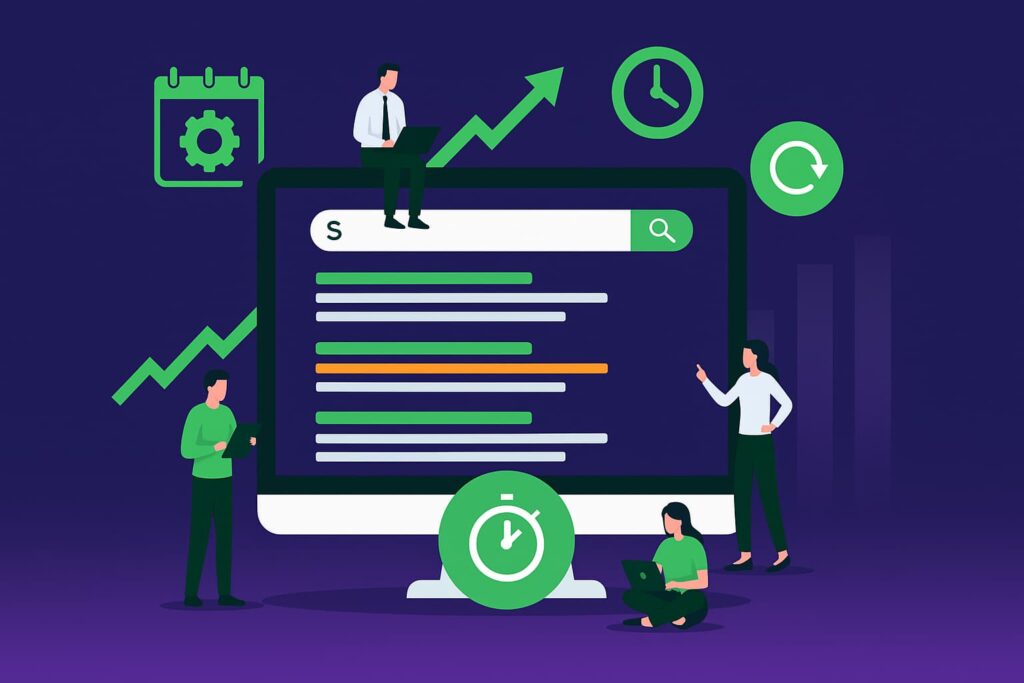If you’ve ever noticed your website traffic spike or dip seemingly overnight, you’re not alone. Many have also wondered how often does Google update search results. Google’s search results aren’t static; they evolve constantly.
In fact, Google runs hundreds of thousands of experiments each yearthat lead to thousands of improvements to Search.That means what you see on page one today could look completely different tomorrow.
For SEO professionals and business owners, understanding how often Google updates search results can help you stay ahead of ranking shifts, content trends, and algorithmic changes.
Let’s take a look at what’s really happening behind the scenes and how often Google refreshes what we see in the SERPs (Search Engine Results Pages).
Understanding What “Google Updating Search Results” Really Means
Before diving into frequency, it’s important to clarify what “updates” actually refer to. Google doesn’t just have one big switch it flips every few months.
The search engine uses multiple systems that constantly evaluate and re-rank billions of pages worldwide. There are three main types of updates happening at different intervals:
- Algorithm updates– These are changes to Google’s ranking systems, like Core Updates or spam updates. They determine how pages are evaluated and ranked.
- Index updates– Every time Googlebot crawls and discovers new content, that information is added to Google’s index. This happens continually.
- SERP updates– Beyond algorithms, Google also experiments with how search results are displayed such as featured snippets, “People Also Ask” boxes, or new AI-generated overviews.
So when people say “Google updated its results,” they could mean any mix of these from a broad algorithmic shift to new content being indexed in real time.
Daily Tweaks vs. Core Algorithm Updates
One of the biggest misconceptions about Google updates is that they only happen during “Core Updates.” In reality, Google’s systems update search results daily. Sometimes even multiple times per hour, as new content is crawled, indexed, and re-evaluated.
Core updates, on the other hand, are large-scale changes to how Google assesses quality and relevance. These typically roll out several times a year and cause noticeable volatility in rankings. Google officially announces them on its Search Status Dashboard or via Search Liaison.
Between these, smaller adjustments are made constantly. Think of them as fine-tuning.
Google performs thousands of ranking improvements annually to ensure results stay relevant. This means there’s rarely a day when search results aren’t shifting, even if only slightly.
What Triggers Google’s Updates?
Google’s mission is simple: to organize the world’s information and make it universally accessible and useful. But achieving that means constantly refining how it interprets content and intent.
Here are a few key factors that trigger updates:
- User experience improvements:Google monitors search behavior closely. If users consistently click a result and bounce back quickly, that signals low satisfaction — prompting ranking adjustments.
- Spam and manipulation control:Systems target low-quality, AI-spun, or link-scheme content to keep results useful.
- E-E-A-T alignment:Updates increasingly favor content that demonstrates Experience, Expertise, Authoritativeness, and Trustworthiness.
- Technology evolution:With AI-driven models and new features, Google continuously tests smarter ways to understand queries and context.
Each of these goals can lead to visible ranking changes, even if there’s no official announcement.
How Often Do Search Results Actually Change?
If you run a site and track rankings, you’ve probably noticed fluctuations day-to-day. That’s because Google’s search results are dynamic, not just from algorithm updates but from freshness signals, personalization, and location factors.
Here’s how these influence how often results shift:
- Content freshness:When Google detects newer or more relevant pages, it may replace older results quickly. For news or trending queries, updates can occur multiple times a day.
- Personalization:Results may change depending on your search history, location, and device, so “updates” can differ from user to user.
- Local intent:Searches like “restaurants near me” or “digital marketing agency” constantly refresh based on reviews, open hours, and new listings.
- Testing & experimentation:Google runs constant tests to see which layouts or result mixes perform better.
In short, while major algorithm updates may occur a few times a year, micro-updates and re-rankings happen continually. For competitive industries, this can mean daily movement across key terms.
Visible Signs of an Update
While Google doesn’t always announce its updates, an experienced SEO agency in Sacramento like Sierra Exclusivecan often tell when one is happening. Common signs include:
- Sudden ranking spikes or drops across multiple pages
- SERP volatility detected by tools like Semrush Sensor or MozCast
- Industry chatter from SEOs noticing similar movements
- Temporary fluctuations (as Google re-evaluates pages during rollout)
However, not all changes are negative. Sometimes, updates reward sites that have been consistently improving content quality, internal linking, or user engagement metrics.
How to Stay Ahead of Google’s Constant Changes
Trying to “game” Google’s updates is a losing battle. Instead, the best approach is to focus on what never changes: delivering value and aligning with Google’s quality signals.
Whether you manage your own website or partner with professional SEO services, the goal remains the same. Build a strategy that can adapt, not react, to Google’s constant evolution.
Here’s how to future-proof your SEO efforts:
- Focus on high-quality, original content.Write for users first, not algorithms.
- Keep your content fresh.Regularly update key pages, add new data, and revisit topics that evolve quickly.
- Track your performance.Use Google Search Console, Analytics, and rank trackers to spot trends early.
- Stay informed.Follow credible SEO news outlets and Google’s own announcements.
- Optimize for E-E-A-T.Showcase author credentials, cite sources, and maintain a clear About/Contact section to build trust signals.
- Build resilience.Avoid relying on a single keyword or traffic source. Diversified visibility reduces the impact of unexpected updates.
By focusing on user experience and consistent optimization, you’ll be less affected by algorithmic shifts and better positioned to benefit from them.
So, How Often Does Google Really Update Search Results?
Constantly.
Google’s systems never stop refining, reindexing, or testing. The search results you see now are the product of real-time crawling, AI-driven ranking adjustments, and ongoing experiments.
Here’s the simplest way to frame it:
- Minor changes:Happen daily or hourly as pages are added, removed, or refreshed.
- Algorithmic adjustments:Occur weekly to monthly, often without official confirmation.
- Core updates:Roll out several times per year, producing the most noticeable ranking shifts. In 2025, for example, Google hasalready rolled out two core updates(March and June), as listed on Google’s official Search Status Dashboard.
Understanding this cadence helps you interpret ranking fluctuations more calmly. If you see movement, it’s not necessarily “punishment”. It could simply be Google’s systems recalibrating relevance.
Conclusion
Google’s search results are in a state of perpetual motion. With thousands of adjustments happening every year – some minor, some major – no two days in SEO are ever quite the same.
The good news? You don’t need to chase every update. The most successful websites aren’t those reacting to every algorithm shift, but those building long-term authority through consistent, user-first strategies.
Focus on relevance, trust, and value – the pillars Google always rewards – and you’ll thrive no matter how often the search results change.
Ready to Strengthen Your SEO Strategy?
Staying ahead of Google’s changes doesn’t have to feel overwhelming. At Sierra Exclusive, our tailored SEO services in Sacramentoare designed to help your business stay visible, compliant, and competitive. No matter how often Google updates its algorithms.
We combine data-driven strategies with hands-on expertise to help your website grow sustainably. Our team can help you with:
Get in touch with our SEO team todayto start building an SEO strategy that thrives through every update.
Frequently Asked Questions
1. Do Google’s search results change every day?
Yes. Google’s search results change daily (even hourly) as new content is crawled, indexed, and re-evaluated. While some shifts are small, others happen during broader algorithm or core updates.
2. What factors determine how often Google crawls and indexes a website?
Google’s crawl frequency depends on your site’s authority, update rate, sitemap structure, and server performance. Sites that publish fresh, high-quality content more often are typically crawled more frequently.
3. How long does it take Google to reflect changes made on a website in search results?
It can take anywhere from a few hours to several weeks. Minor updates on well-established pages may appear faster, while new or low-authority pages can take longer to reindex and reflect changes.
4. Are all queries updated at the same rate in Google’s search results?
No. Search results for trending or news-related queries may change multiple times a day, while evergreen topics update less frequently. Google prioritizes freshness where user intent demands it.
5. How can I tell if a change in my ranking is due to a Google update?
You can check theGoogle Search Status Dashboardor follow updates fromGoogle Search Central. SEO tools like Semrush Sensor and MozCast also help detect algorithm volatility.
6. Do major updates always get announced by Google?
No. Google announces major updates like Core or Spam Updates, but most smaller ranking adjustments happen quietly in the background.
7. How do Core Updates differ from the Helpful Content Update (HCU)?
Core Updates are broad algorithmic changes that affect multiple ranking factors. The Helpful Content Update (HCU) specifically targets content created for users rather than search engines, promoting originality and relevance.
8. Does Bing update search results as often as Google?
Bing updates its index and algorithms regularly, but not as frequently or visibly as Google. However, it also uses AI-driven ranking systems that continuously refine search quality.

